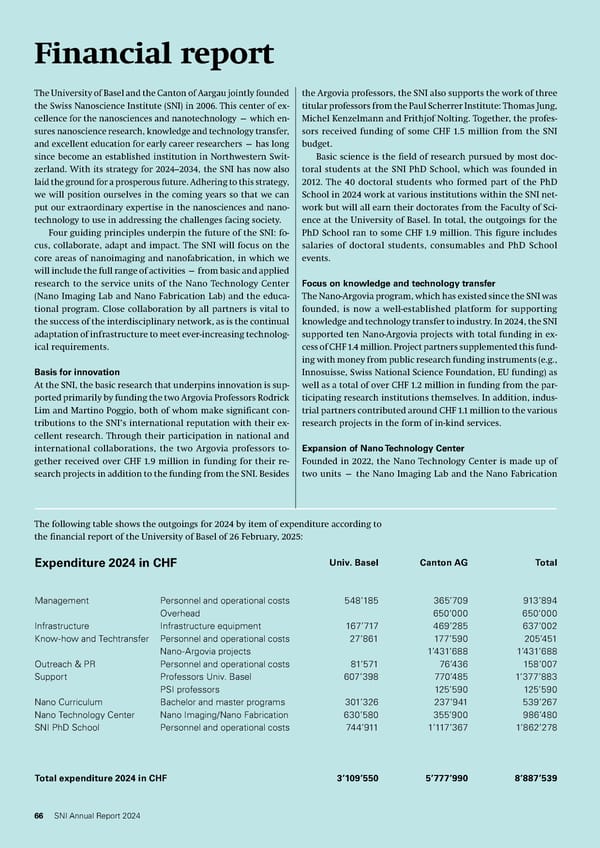Financial report The University of Basel and the Canton of Aargau jointly founded the Argovia professors, the SNI also supports the work of three the Swiss Nanoscience Institute (SNI) in 2006. This center of ex- titular professors from the Paul Scherrer Institute: Thomas Jung, cellence for the nanosciences and nanotechnology — which en- Michel Kenzelmann and Frithjof Nolting. Together, the profes- sures nanoscience research, knowledge and technology transfer, sors received funding of some CHF 1.5 million from the SNI and excellent education for early career researchers — has long budget. since become an established institution in Northwestern Swit- Basic science is the field of research pursued by most doc- zerland. With its strategy for 2024–2034, the SNI has now also toral students at the SNI PhD School, which was founded in laid the ground for a prosperous future. Adhering to this strategy, 2012. The 40 doctoral students who formed part of the PhD we will position ourselves in the coming years so that we can School in 2024 work at various institutions within the SNI net- put our extraordinary expertise in the nanosciences and nano- work but will all earn their doctorates from the Faculty of Sci- technology to use in addressing the challenges facing society. ence at the University of Basel. In total, the outgoings for the Four guiding principles underpin the future of the SNI: fo- PhD School ran to some CHF 1.9 million. This figure includes cus, collaborate, adapt and impact. The SNI will focus on the salaries of doctoral students, consumables and PhD School core areas of nanoimaging and nanofabrication, in which we events. will include the full range of activities — from basic and applied research to the service units of the Nano Technology Center Focus on knowledge and technology transfer (Nano Imaging Lab and Nano Fabrication Lab) and the educa- The Nano-Argovia program, which has existed since the SNI was tional program. Close collaboration by all partners is vital to founded, is now a well-established platform for supporting the success of the interdisciplinary network, as is the continual knowledge and technology transfer to industry. In 2024, the SNI adaptation of infrastructure to meet ever-increasing technolog- supported ten Nano-Argovia projects with total funding in ex- ical requirements. cess of CHF 1.4 million. Project partners supplemented this fund- ing with money from public research funding instruments (e.g., Basis for innovation Innosuisse, Swiss National Science Foundation, EU funding) as At the SNI, the basic research that underpins innovation is sup- well as a total of over CHF 1.2 million in funding from the par- ported primarily by funding the two Argovia Professors Rodrick ticipating research institutions themselves. In addition, indus- Lim and Martino Poggio, both of whom make significant con- trial partners contributed around CHF 1.1 million to the various tributions to the SNI’s international reputation with their ex- research projects in the form of in-kind services. cellent research. Through their participation in national and international collaborations, the two Argovia professors to- Expansion of Nano Technology Center gether received over CHF 1.9 million in funding for their re- Founded in 2022, the Nano Technology Center is made up of search projects in addition to the funding from the SNI. Besides two units — the Nano Imaging Lab and the Nano Fabrication The following table shows the outgoings for 2024 by item of expenditure according to the financial report of the University of Basel of 26 February, 2025: Expenditure 2024 in CHF Univ. Basel Canton AG Total Management Personnel and operational costs 548’185 365’709 913’894 Overhead 650‘000 650‘000 Infrastructure Infrastructure equipment 167’717 469’285 637’002 Know-how and Techtransfer Personnel and operational costs 27’861 177’590 205’451 Nano-Argovia projects 1’431’688 1’431’688 Outreach & PR Personnel and operational costs 81’571 76’436 158’007 Support Professors Univ. Basel 607’398 770’485 1’377’883 PSI professors 125’590 125’590 Nano Curriculum Bachelor and master programs 301’326 237’941 539’267 Nano Technology Center Nano Imaging/Nano Fabrication 630’580 355’900 986’480 SNI PhD School Personnel and operational costs 744’911 1’117’367 1’862’278 Total expenditure 2024 in CHF 3’109’550 5’777’990 8’887’539 66 SNI Annual Report 2024
 Annual Report 2024 - Swiss Nanoscience Institute Page 65 Page 67
Annual Report 2024 - Swiss Nanoscience Institute Page 65 Page 67